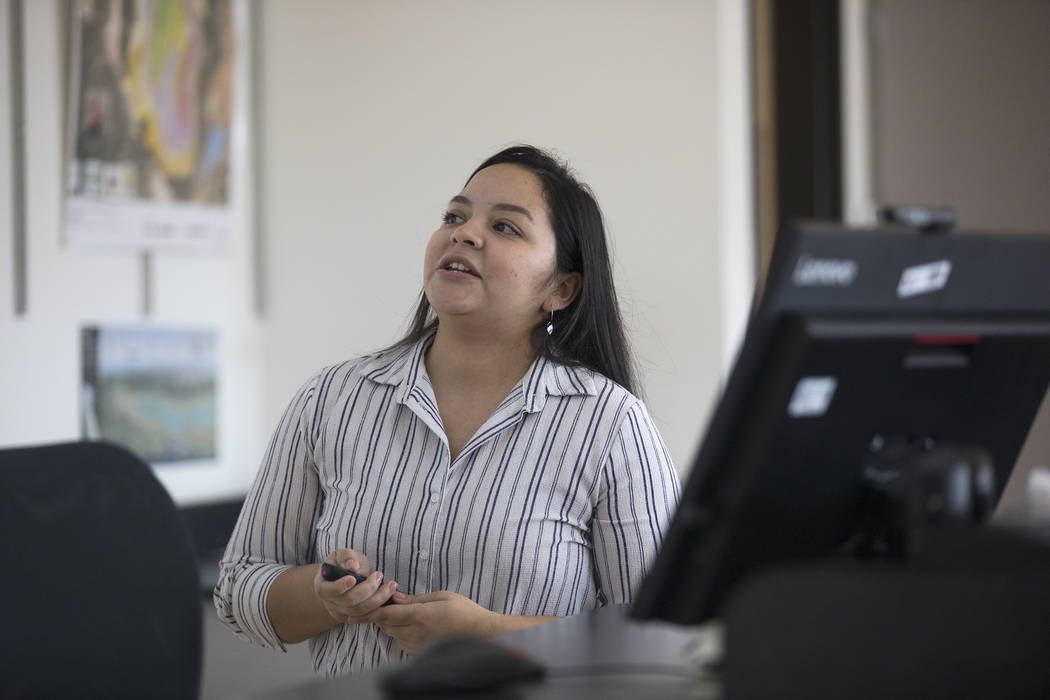CSN to offer bachelor’s degree in environmental management

The College of Southern Nevada will offer a new bachelor’s degree starting in August to help students prepare for environmental management careers.
It took about two years for the community college, in partnership with industry, to create the Bachelor of Applied Science in environmental management program. The Nevada System of Higher Education Board of Regents approved it in September.
The program is designed to accommodate nontraditional students — those who go to college later in life — and focuses on hands-on learning. Officials want to prepare graduates for jobs in an industry in which employers often struggle to find qualified local candidates.
“We wanted to make sure students graduate with the skills they need to benefit employers and their marketability,” said Doug Sims, CSN’s dean of the School of Science and Mathematics.
At CSN, an associate’s degree program in environmental management launched in August. About 80 students are enrolled — 70 percent of whom are nontraditional students. Associate’s degree graduates can fill jobs such as being a geotechnical lab technician or doing field sampling.
Giavanna Fernandez, a student in the associate’s degree program, plans to earn a bachelor’s degree.
“It’s going to provide better opportunities and more experience,” she said.
When the 23-year-old found out CSN was creating a bachelor’s degree program in environmental management, “I was super, super excited,” Fernandez said, noting it’s cheaper than other options, she already knows Sims and she doesn’t have to move.
Fernandez is aiming for a career in environmental botany. She said she enjoys “learning about plants, pollution and ways to clean up areas.”
New bachelor’s degree
Sims collaborated with Kirk Stowers, a Henderson-based principal geologist at Broadbent & Associates, to create CSN’s new program. Broadbent & Associates is an “environmental remediation, water resource, and civil engineering firm” with locations across the country, according to its website.
“We started to see a need for people to be trained with hands-on learning,” Sims said.
Elsewhere in Nevada, similar offerings include UNLV’s bachelor’s degree in earth and environmental science, UNR’s bachelor’s degree in environmental science, and Nevada State College’s bachelor’s degree in environmental and resource science.
CSN expects to have 20 to 25 students this fall in its new program, which is designed to be completed in two years. Students will choose from four focuses: environmental, chemistry, geological or biological.
Classes will start no earlier than 4:30 p.m. to accommodate students who have a job or family responsibilities, Sims said.
To enroll, students must graduate with an Associate of Applied Science degree in environmental management or complete all of their coursework for the degree. They must also have a minimum GPA of 2.0.
With a low threshold for a GPA requirement, “we’re trying to open it up for a lot of people,” Sims said, including students who’ve struggled. Students can truly excel, he said, once they’re excited about a career in a field they’re interested in.
Local worker shortfall
What’s environmental management? “Environmental managers coordinate and manage major environmental health and safety projects and programs,” according to a CSN program overview, provided to the Review-Journal by Sims.
One example of what environmental consultants do: remediating leaked fuel from underground storage tanks, Stowers said. They also help industries evaluate and manage emissions from their facilities, he said, adding, “Air quality is always an issue in the Las Vegas Valley.”
The median pay in 2018 for environmental scientists and specialists was $71,130 per year, according to the U.S. Bureau of Labor Statistics. The number of jobs was expected to rise 8 percent — faster than the average for all occupations — between 2018 and 2028.
The Las Vegas Valley is home to many environmental consulting firms, but it’s tough to find workers locally, Stowers said, adding they’ve looked across the country to fill entry-level staff positions at Broadbent & Associates.
Having local graduates who are prepared for the career, Stowers said, is “incredibly helpful for us.”
Pursuing a career
When Fernandez started in 2014 at CSN, she was a performing arts major for 1 1/2 years.
“It kind of dawned on me: ‘I don’t want to do Broadway,’” she said.
Fernandez opted for studying environmental science. Through the program, she likes the opportunity to do independent studies – her own research under supervision.
“I think that’s really, really great for us as upcoming scientists,” she said.
Fernandez is a part-time student and works, but plans to pursue her studies full time starting in the spring semester.
Fernandez, who has lived in the Las Vegas area for years, wants to eventually move to her hometown of Everett, Washington.
“The environmental field is much more abundant there,” she said.
Fernandez’s classmate, 23-year-old Juan Garcia, also plans to pursue a bachelor’s degree.
“It worked out in my favor,” Garcia said about CSN’s new offering. “It was just really good timing.”
One of the deciding factors for staying at CSN for a bachelor’s degree: “There’s a lot of hands-on training with this degree,” he said, including internship and research opportunities. “For me, that was really important.”
Garcia plans to eventually move to Washington to work on a master’s degree. He wants to do research for a nonprofit organization in environmental biology and conservation.
Last year, Garcia completed a six-month internship with the The Nature Conservancy, a worldwide nonprofit organization with a Las Vegas office. He said he realized he wanted to pursue field work because that’s the “getting your hands dirty science side of conservation.”
Contact Julie Wootton-Greener at jgreener@reviewjournal.com or 702-387-2921. Follow @julieswootton on Twitter.